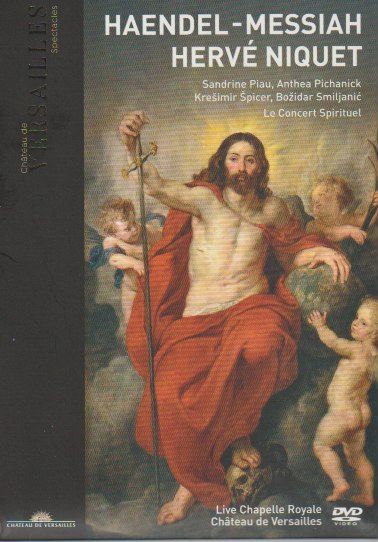A Messiah from Versailles: Hervé Niquet conducts

There is a plethora of Messiahs around anyway (any advances on a collective noun for Messiahs?), so why another. Read on ...
Recorded in the glorious chapel of Versaillles, this is a ompletely rethought Messiah - in complete and utter contrast to a Messiah at he Festival Hall on Saturday, 4 December, courtesy of one Rayond Gubbay - there, an old-style, massive chorus, modern instruments, Mahleerian-slow. Niquet and his be;oved Concert Spirituel are the polar opposite. Listen to Niquet's Overture to begin with - so lightly sprung,
Let's start off with a video of the complete performance (but if you stick to that you are missing out massively - the Château de Versailles Spectacles DVD is a thing of beauty, with wonderful booklet and casing):
If you stick with the video, you also miss out on Olivier Rouvier’s wonderful booklet notes which point out, for instance, that “Christ is as absent as the Arlesinne is from Bizet's eponymous work” (Christ is actuallly only mentioned in the penultimate chorus).
The tenor 'Evr'y Valley' is taken by Božidar Smiljanic, beautifully honeyed of voice; how it contrasts with the well-sprung ‘And the glory of the Lord’ chorus. Smiljanic's ‘Why do the nations,’ in contrast, is dramatic in the extreme, his recitatives shot through with energy; the enthusiasm of the chorus to do exaclt what they sing - ‘Let us break our bounds asunder’ seems the only reasonable response. Only in ‘Thou shalt break them’ does he disappoint - the delivery is somewhat underpowered.
If I find Anthea Pichanick a little low-voltage in “For he is like a refiner‘s fire,’ I find bass-baritone Bożidar Smiljanić far more appealing in ‘For behold ... ” beautifully, darkly shaded and ther perfect contrast to Niquet's brilliant, lightly sprung take on ‘For unto us a child is born’. Niquet's choruses tend towards the light, and it sounds impeccably Handelian: his speed for ‘His yoke is easy’ is ddaringly rapid, but he has the choir that can do it. Even ‘Since by man came death’ Niquet creates teh contrast mainly through the choir's shading of the text than by tempo difference.
But it is the entry of Sandrine Piau that take sthis already exalted Messiah to another level. her voice is so pure, and after hearing her Pamina with Rousset at Gstaad earlier this year, it does rather appear that everything she touches (read sings) turns to gold.

Piau's sequence of recitatives leading to the chorus ‘Glory to God’ is simp;y delicious, while her ‘Rejoice greatly’ is the epitome of Handelian style. And those melismas! Later, in Part II, her ‘How beautiful were the feet’ is shot full of beauty, complemented by the most polished phrasing from the strings.
It is Niquet that makes this the most vital, dramatic and yet deeply spiritual Messiah I have heard. Listen to the chorus ‘Surely He hath borne our grief‘ from Part II, or the string sbefore the tenor recitative ‘All they that see Him laugh Him to scorn’ (preceding the swiftest 'He trusted in God’ I think I've ever heard, performed at a uniform pianissimo and with unutterable accuracy). His ‘Hallelujah’ chorus is initially restrained, uncurling shlowly with surprising plateaux of legato. As far as I can see the audence do not stand up for this (King George II has a lot to answer for).
The third and shortest part could hardly begin better - ‘I know my Redeemer liveth’ in the safest of hands, those of Sandrine Piau. How fascinating to hear a cushion of string warmth, reassuring, against the text's reference of worms destroying Christ's human body. A word for trumpeter Jean-François Madeuf's contribution to ’The Trumpet Shall Sound,‘ performed of course on a natural (without vales) trumpet with impeccable accuracy. It feels quite right that the final solo item is for soprano, Piau stunning in ‘If God be for us, who can be against us?’. The final chorus, ‘Worthy is teh Lamb that was slain’ is a miracle of contrasts. How brisk is teh fugue at ‘Blessing and honour and power be unto Him’. Bt it is the final tract, the ‘Amen’ that impresses so much, the counterpoint on the strings a thing of uttermost beauty, the devotion of the chorus beyond doubt. Keep listening to the end - there's a wonderful timpani riff that comes as a pleasant, and energising, surprise.
The video is perfectly conceived, camera angles carefully considered. A necessary purchase, I would suggest.
This is one of three Messiahs I have covered this month so far (it's only the 8th!): John Nelson's phenomenal Coventry performance on medici.tv, plus that rather less worthy one at the Festival Hall in a Raymond Gubbay extravaganza. This is the review of the Gubbay performance (please note the title was not of my making, and the soloists did not solve the porblems of this performance!). And don't forget Classical Explorer also covered Robert Wilson's staging previously, conducted by Minkowski, here.
